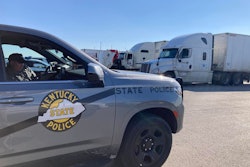Trucking news and briefs for Friday, March 1, 2024:
I-81's split speed limit will disappear March 4 in Tennessee
Beginning Monday, March 4, drivers traveling I-81 in Northeast Tennessee will no longer see a split speed limit for cars and trucks.
Recent "spot speed studies, crash analyses and the continuity of speed zones" led the the Tennessee Department of Transportation's decision, as noted below, to modify the limits between the Washington County line and the Virginia state line.
Instead of the current speed limits of 65 mph for cars and 55 mph for trucks, the new speed limit will be 70 mph for all vehicles.
This study was conducted as a result of comments received from the general public, as well as TDOT partners in law enforcement and local municipalities. The speed limit change is being made in the interest of the motoring safety of the public, TDOT noted.
Crews will be replacing signage next week along this corridor, depending on weather. Motorists should use extreme caution in this area, TDOT said.
[Related: Speed-limiter mandate: Owner-operator call out FMCSA's misplaced priorities]
Two states looking to curb nuclear verdicts
The trucking industry recently scored legislative victories in two states that could have implications on nuclear verdict-type judgments in litigation following commercial truck crashes.

The Wisconsin State Legislature passed a reform to the state’s civil litigation system, capping non-economic damage awards at $1 million. America Trucking Associations President and CEO Chris Spear said capping subjective, non-monetary losses is critical to ensuring fairness and balance in civil litigation and will deter abusive and frivolous lawsuits that have turned the judicial system "into a profit center for the plaintiffs’ bar."
Spear called the dynamic "jackpot justice," deleterious "not just trucking companies, but consumers too in the form of higher insurance rates and higher prices for everyday goods. This reasonable reform ensures justice and fairness drive accident litigation outcomes, not profits.”
[Related: Trucking Law: How to protect your business after a crash]
The legislation (SB 613) passed the State Assembly by voice vote and the State Senate 21-11 and heads to Gov. Tony Evers’ desk for signature. The Wisconsin Civil Justice Council expects Evers to veto the bill, however.
Wisconsin Motor Carriers Association President Neal Kedzie said the legislation has broad support across the state, adding "rampant lawsuit abuse is impeding our ability to do our job safely and efficiently."
The Indiana General Assembly in February also passed civil justice reform legislation that would amend the state’s seatbelt admissibility statute pertaining to automobile accident litigation. The bill, which passed the legislature with bipartisan support and now heads to Gov. Eric Holcomb’s desk, would make evidence of a litigant’s non-usage of a safety belt admissible in court in most cases.
“This is a commonsense measure that only increases transparency and ensures jurors have complete information when rendering a fair and just verdict,” said Spear. “Indiana is one of many states in recent years to amend the so-called ‘seatbelt gag rule,’ a legacy of a bygone era when seat belt use wasn't common and the safety benefit wasn't universally accepted like it is today.”
[Related: The pervasive impact of nuclear-verdicts hype, threat]
NFI deploys 50 battery-electric trucks, partners for charging depot
 NFI is deploying 50 battery-electric Class 8 trucks for its Southern California operations.JETSI
NFI is deploying 50 battery-electric Class 8 trucks for its Southern California operations.JETSI
Port drayage and intermodal fleet NFI announced this week that it has received 50 Class 8 battery-electric trucks to put to work in its Southern California operations.
The trucks -- 30 Freightliner eCascadias and 20 Volvo VNR Electrics -- were funded through the Joint Electric Truck Scaling Initiative (JETSI) project.
To support its scaled battery-electric fleet, NFI has collaborated with Electrify America and Southern California Edison to energize its electric charging depot at its warehouse facility in Ontario, California. The charging depot supports refueling speeds up to 350 kW for capable trucks and will feature roughly 7 MW of DC charging capacity shared across 38 individual DC fast chargers when the facility is fully completed.
NFI’s newly inaugurated electric truck maintenance shop at the site is also operational.
[Related: Revoy EV: Turning diesels to hybrids in five minutes or less]
NFI’s battery-electric fleet is used to run routes from Ontario, California, to the Ports of Los Angeles and Long Beach, performing drayage operations and delivering products to warehouses in Southern California. Its fleet of Freightliner eCascadia and Volvo VNR Electric trucks typically runs two port pickups per day, per truck, for an average of 220 miles driven between being recharged.
The 50 additional battery-electric trucks deployed through the JETSI project will offset approximately 4,400 metric tons of greenhouse gas emissions yearly, resulting in 2.45 tons of weighted criteria pollutant emission reductions and displacing over 2,750,000 gallons of diesel throughout the five-year project, the company said.
[Related: Electric-truck purchase incentives present big challenges for small fleets, owner-operators]









